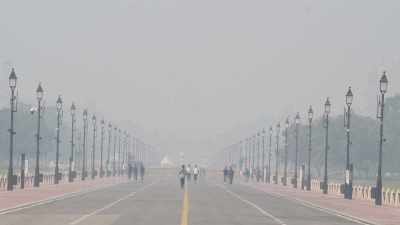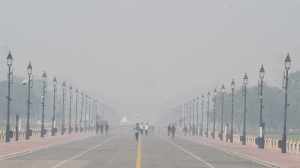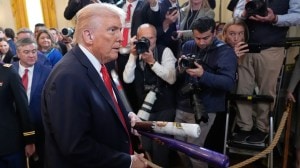They could rule India
The sixth pay commission is happening. Can’t say the same about civil service reform

Budget 2008-09 had something for everyone, including the civil and armed services. The sixth pay commission is expected to submit its recommendations to the UPA government this month. The Manmohan Singh government is expected to announce hikes in pay and allowances for its 55 lakh employees — at the cost of some Rs 26,000 crore to the exchequer — perhaps close to the general election in order to get the maximum political mileage. Although it is nobody’s case to deny government employees their rightful due, this exercise would be incomplete if it was not accompanied by administrative reform.
Consider the following. A day after the terrorist attack at a CRPF recruitment centre at Rampur on January 1, Uttar Pradesh Cabinet Secretary Shashank Sekhar Singh held a meeting with top police officers, including Director General of Police Vikram Singh and all the additional DGPs, in Lucknow. The main agenda was the attack, but the meeting was used as a platform to vent Chief Minister Mayawati’s ire on the shoddy security treatment given to her during a visit to Rampur. During that hastily arranged visit, she had not been provided with a bullet-proof car and the landing ground was not hosed with water and was therefore rather too dusty for a VIP. At this point, DGP Vikram Singh startled his juniors by telling the cabinet secretary that he would personally take care of the chief minister’s security the next time around. Days later, on January 15, a uniformed Vikram Singh was seen offering cake to Mayawati on her birthday.
Even the armed forces are no longer insulated from the politics of the day. An air marshal, who retired in December 2007, was posted to a key IAF command after the defence ministry, obviously under political pressure, slipped into ‘go slow’ mode on files sent by the then air force chief for approval. The message from South Block was: either post the air marshal in Delhi or face non-cooperation. The officer, who incidentally was thick into controversy surrounding the ‘near revolt’ in the IAF post-fifth pay commission, got his posting in Delhi.
The surface transport and shipping minister, T.R. Baalu of the DMK, changed the chairman of the National Highways Authority of India thrice last year. He tried to run roughshod over the appointment of the shipping secretary this year. The same minister took his time implementing a cabinet directive on the appointment of the chairman of the Shipping Corporation of India in 2004.
One factor cited for the current crisis is the increasing clout of regional political parties. This often creates pressure on officers to follow regionally determined agendas, instead of seeing things from a national perspective.
It is not that only politicians are to be blamed for corrupting or enfeebling the bureaucracy today. Not so long ago a joint secretary in a Central ministry was empowered to take decisions on even critically sensitive issues like India-Pakistan relations or sharing river waters. In case of an inter-ministry dispute, the matter would be referred to the committee of secretaries, headed by the cabinet secretary, for the final word before the matter was approved by the Union cabinet. But with the advent of coalitions even the committee of secretaries cannot take a decision any more and needs guidance from political bosses. There are some 50 Groups of Ministers and more than 30 Empowered Groups of Ministers in existence to sort out mundane issues from the statutory warnings on beedi packets to the more tricky Sethusamudram issue.
Civil servants, as they will tell you, are also wary of taking decisions, because they can be so easily hauled up by a senior officer or come under the scrutiny of the Central Bureau of Investigation or the Central Vigilance Commission for acts of commission. Acts of omission, however, carry fewer risks of harassment. Perhaps, in the regime of the day, the bureaucrat just might get an extension or a job on some appellate authority after retirement.
Since he took office in 2004, Prime Minister Manmohan Singh has often talked about insulating the bureaucracy from politics. He has mooted fixed tenures for key offices like the superintendent of police or the district magistrate, and in this context has written to all state secretariats. But given the state of play in the ruling coalition over the final say in decision-making and a Prime Minister’s Office headed by a decent principal secretary, T.K.A. Kutty Nair, state governments tend to carry on regardless. Regional satraps routinely bypass the PMO in getting their own favourites appointed to lucrative jobs.
Although civil and armed service officers make a case for salaries at par with the private sector employee, they do not realise that the latter risks the pink slip for both the bad decision taken and the good decision not taken. There is, therefore, a good case for introducing selectivity and merit in bureaucratic promotions. Why should only seniority and proximity to political power be the criterion for bureaucratic appointments? Even the British, who left India this legacy, have changed and started inviting private sector employees for key assignments through advertisements in the media.
In the present globalised and highly competitive environment, only nations with fast decision-making capabilities are likely to catch the opportunities for development and investment. Reform is urgently needed. Or the present system of spoils and political patronage in the garb of seniority could ensure the collapse of what Lord Nicholas Kaldor, Dr Singh’s teacher at Cambridge, 50 years ago referred to as the key decisionmakers of a nation.
shishir.gupta@expressindia.com






- 01
- 02
- 03
- 04
- 05

























